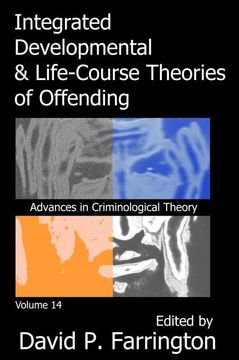Reseña del libro "Integrated Developmental and Life-Course Theories of Offending (en Inglés)"
Developmental and life-course criminology aims to provide information about how offending and antisocial behavior develops, about risk and protective factors at different ages, and about the effects of life events on the course of development. This volume advances knowledge about these theories of offender behavior, many of which have been formulated only in the last twenty years. It also integrates knowledge about individual, family, peer, school, neighborhood, community, and situational influences on offender behavior, and combines key elements of earlier theories such as strain, social learning, differential association, and control theory.Contributors Benjamin B. Lahey and Irwin D. Waldman focus on antisocial propensity and the importance of biological and individual factors. Alex R. Piquero and Terrie E. Moffitt distinguish between life-course-persistent and adolescent-limited offenders. David P. Farrington presents the Integrated Cognitive Antisocial Potential (ICAP) theory, which distinguishes between long-term and short-term influences on antisocial potential. Richard F. Catalano, J. David Hawkins, and their colleagues test the Social Development Model (SDM).Marc Le Blanc proposes an integrated multi-layered control theory, in which criminal behavior depends on bonding to society, psychological development, modeling, and constraints. Robert J. Sampson and John H. Laub hypothesize that offending is inhibited by the strength of bonding to family, peers, schools, and later adult social institutions such as marriage and jobs. Terence P. Thornberry and Marvin D. Krohn propose an interactional theory, of antisocial behavior. Per-Olof H. Witkstrï 1/2m's developmental ecological action theory emphasizes the importance of situational factors: opportunities cause temptation, friction produces provocation, and monitoring and the risk of sanctions have deterrent effects.

